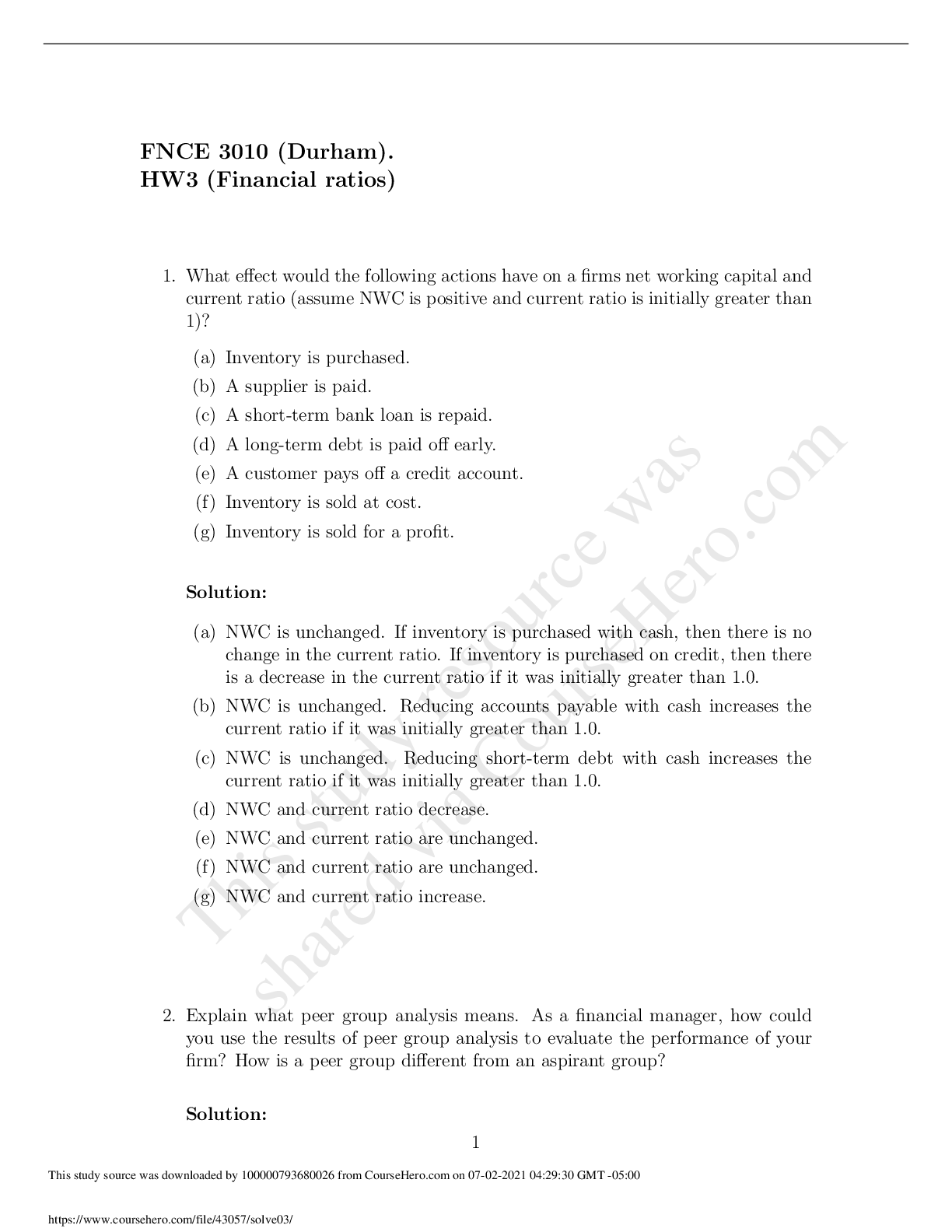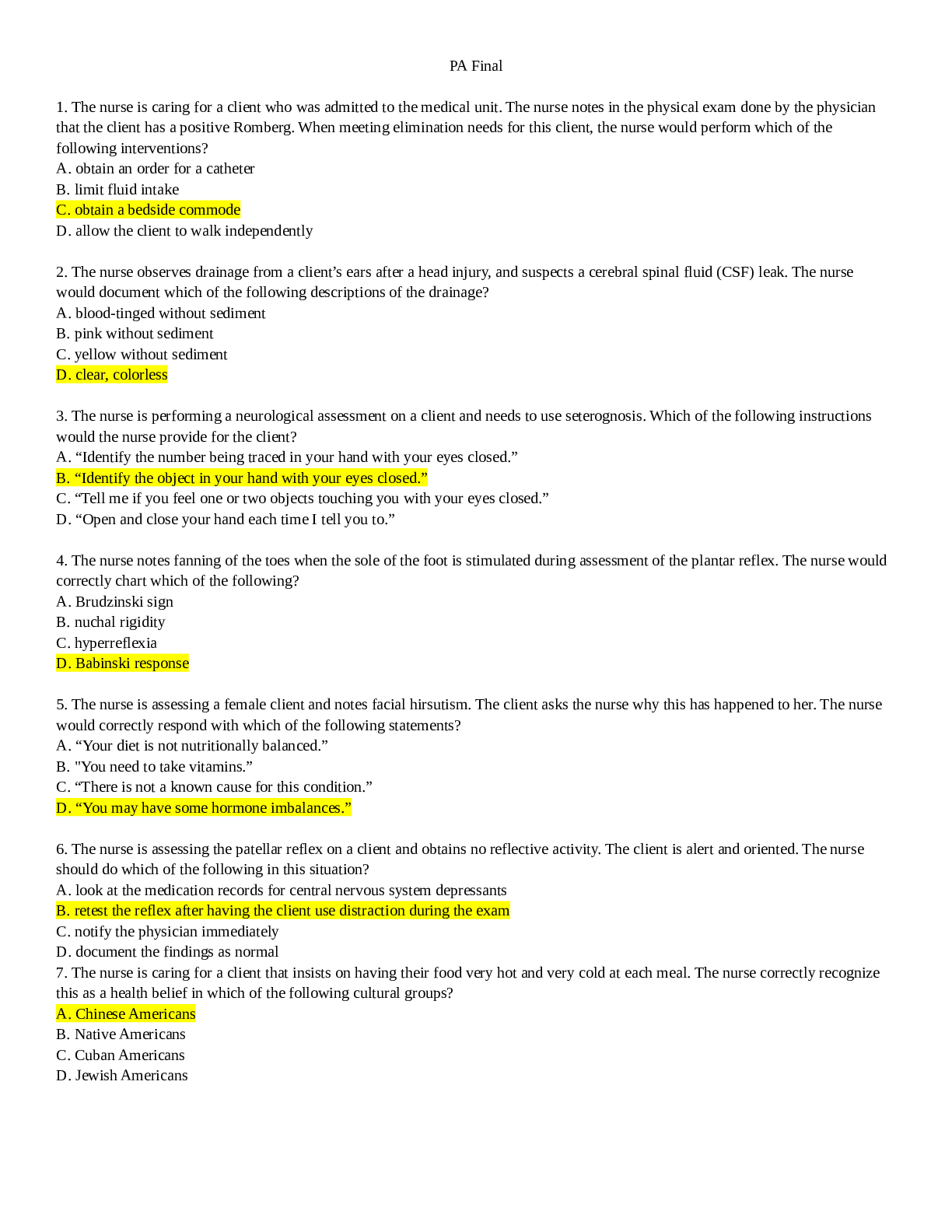*NURSING > QUESTIONS & ANSWERS > University Of Colorado Boulder > NURSING > University of Colorado, Boulder - NURS 1 (All)
University Of Colorado Boulder > NURSING > University of Colorado, Boulder - NURS 1
Document Content and Description Below
Medical-Surgical Nursing, 2e Chapter 34 Question 1 Type: MCSA A 60-year-old male patient is being seen in the clinic for an annual physical. Which assessment finding would the nurse discuss with t... he patient in regard to preventing future heart failure? 1. High hemoglobin A1C 2. Blood pressure 119/78 3. Father-in-law died from heart disease a year ago 4. Male Question 2 Type: MCSA A patient with heart failure has orthopnea, tachycardia, fatigue, and activity intolerance. How would the nurse explain the presence of these findings? 1. “You are not coping with your body’s changing health.” 2. “Your body’s protective mechanisms are malfunctioning.” 3. “You have not been following instructions on caring for yourself.” 4. “Your body is trying to maintain an adequate blood pressure and oxygen supply.” Question 3 Type: MCSA The nurse assesses that a patient is more anxious than usual. The patient states, "I don't understand how I can still be alive when my heart has failed." Which nursing response is indicated? 1. "Heart failure is a common problem in the United States. Many people have it. They all have problems such as yours." 2. "Heart failure doesn't mean your heart has quit, just that it no longer is as efficient as it once was." 3. "You seem upset. Would you like for me to call the health care provider to explain this to you?" 4. "Heart failure is pretty complicated. It means the heart is failing to work." Question 4 Type: MCSA Which nursing diagnosis would the nurse add to the care plan of a patient diagnosed with acute systolic heart failure? 1. Disturbed Body Image 2. Imbalanced Nutrition: More than Body Requirements 3. Excess Fluid Volume 4. Ineffective Airway Clearance Question 5 Type: MCSA Which assessment finding would the nurse expect when caring for a patient with right-sided heart failure? 1. Has trouble concentrating on the conversation 2. Is dyspneic with activity 3. Has to sleep on three or four pillows at night 4. Consumes 5% of meals and complains of nausea Question 6 Type: MCSA A patient diagnosed with heart failure asks the nurse if the problem is in the right or left side of the heart. Which symptom would indicate to the nurse that left-sided heart failure is occurring? 1. Elevated neck veins 2. Respiration of 36 per minute 3. Dependent edema 4. Right upper quadrant pain Question 7 Type: MCSA A patient with left-sided heart failure is admitted to the unit. Which assessment is a priority upon admission? 1. Abdominal assessment 2. Neurological status 3. Presence of peripheral edema 4. Airway and oxygenation status Question 8 Type: MCSA The nurse is assessing a patient who has been admitted with heart failure. The nurse anticipates which lab test to be ordered to determine the severity of the diagnosis? 1. Troponin 2. Lipid panel 3. CBC 4. BNP Question 9 Type: MCSA A patient is admitted with heart failure. The nurse establishes a nursing diagnosis of Decreased Cardiac Output related to ventricular dysfunction. Which parameter would the nurse evaluate as indicating that cardiac output is sufficient? 1. BP 100/48 2. Daily weight same as the day before 3. CI 1.8 L/min/m2 4. PAOP 8 mmHg Question 10 Type: MCSA A patient is admitted to the hospital with a provisional diagnosis of heart failure. Which laboratory finding would the nurse evaluate as ruling out that diagnosis? 1. BNP 50 pg/mL 2. Normal ECG 3. Sodium 148 mEq/L 4. Hemoglobin 10 g/dl Question 11 Type: MCSA A patient with heart failure is sent home on lisinopril (Zestril). Which medication information should the nurse provide? 1. Lisinopril is a beta-blocker drug that will increase the pumping ability of the heart. 2. Lisinopril is an angiotensin II receptor blocker (ARB) that will lower the heart rate. 3. Lisinopril is a calcium channel blocker that could make heart failure worse. 4. Lisinopril is an ACE inhibitor that lowers blood pressure. Question 12 Type: MCSA A patient diagnosed with heart failure is preparing for discharge. The patient asks the nurse if a special diet is necessary. How should the nurse respond? 1. "A special diet is important for you. Let me tell you about it in detail." 2. "I am glad you asked. The health care provider will be discussing the diet with you." 3. "The pharmacist will be talking with the physician. They will let the dietitian know what is best for you." 4. "I will be reviewing your discharge plans with you, but I would also like to ask the dietitian to come visit with you to help finalize your diet." Question 13 Type: MCSA The nurse uses the acronym MAWDS to teach a patient about self-care management for heart failure. Which instruction would this method contain? 1. “You should return to the clinic for monthly follow-up.” 2. “Check your weight daily.” 3. “Elevate the feet for twenty minutes twice daily.” 4. “Avoid large crowds.” Question 14 Type: MCSA Which statement by a patient with heart failure would indicate to the nurse that the patient does not understand the discharge instructions? 1. "I will increase my activity a little every day." 2. "I will contact the health care provider if I begin gaining weight." 3. "I will eat a low-sodium diet." 4. "I will pick up my new medications in a few days when I get paid." Question 15 Type: MCSA A diabetic patient received instructions from the nurse on ways to minimize further damage to the heart from heart failure. Which patient statement reflects the most important strategy toward this goal? 1. "I will weigh myself every day." 2. "I will follow a diet." 3. "I will take a daily walk." 4. "I will keep my hemoglobin A1C less than 6.4." Question 16 Type: MCSA The nurse is providing medication instruction to a patient who has both hypertension and heart failure. The nurse would expect this patient to be prescribed which drug? 1. Cardiac glycoside 2. ACE inhibitor 3. Antidysrhythmic 4. Anticoagulants Question 17 Type: MCSA A patient is in hospice with a diagnosis of end-stage heart failure. How would the nurse explain the primary treatment goal for this patient? 1. Provide significant pain medications. 2. Provide comfort and reduce any distressing respiratory symptoms. 3. Keep the patient out of the hospital. 4. Provide information to the family. Question 18 Type: MCSA A patient with heart failure is facing the end of life. Which intervention would the nurse prioritize with this patient? 1. Have the health care provider discuss end-of-life topics with the patient. 2. Tell the patient that the family should be the primary source of support, but that nursing staff will be glad to substitute if necessary. 3. Be as honest as possible about the progression of the disease and the support needed. 4. Reassure the patient that death will be painless. Question 19 Type: MCSA The nurse is assessing a patient with chronic heart failure. Which abnormal chest sound would the nurse most likely auscultate? 1. Systolic murmur 2. Friction rub 3. Harsh vesicular lung sounds 4. Crackles Question 20 Type: MCSA The nurse is caring for a patient who has chronic left-sided heart failure. Which statement would the nurse expect in the physician’s written report following cardiac catheterization? 1. “Pressures in the left ventricle and atrium are increased.” 2. “Pressures in the left ventricle and atrium are equal.” 3. “Pressures in the right ventricle and atrium match the left ventricular pressures.” 4. “Pressures in the right ventricle exceed those in the left ventricle.” Question 21 Type: MCSA The nurse caring for a patient with heart failure would expect which assessment findings? 1. S1, S2, and flat neck veins 2. S3 and distended neck veins 3. S2 loudest and followed by S1 4. S4 and flat neck veins Question 22 Type: MCSA Which statement by the patient would the nurse evaluate as significant to the diagnosis of congestive heart failure (CHF)? 1. “I break out in a cold sweat when I eat a large meal.” 2. “I am sleepy after I eat lunch every day.” 3. “I have to prop myself up on three pillows to sleep at night, otherwise I can’t breathe.” 4. “I feel better after I exercise.” Question 23 Type: MCSA An elderly patient was recently discharged to home after treatment for chronic heart failure. The patient experiences a pulse rate increase from 80 beats per minute (bpm) to 102 bpm when walking from the kitchen to the utility room to do laundry. What is an appropriate nursing action for the home health nurse? 1. Encourage the patient to complete tasks such as laundry early in the morning before fatigue is an issue. 2. Recommend that the patient ignore the pulse rate and become more active to build stamina. 3. Encourage the patient to rest for 30 minutes between completing each load of laundry. 4. Encourage the patient to sit and rest in the utility room and whenever the patient feels the pulse rate increase. Question 24 Type: MCMA The nurse assesses for which sign of decreased cardiac output and tissue perfusion in a patient with heart failure? Note: Credit will be given only if all correct choices and no incorrect choices are selected. Standard Text: Select all that apply. 1. Reduced mental alertness 2. Increased urine output 3. Abdominal distention 4. Strong peripheral pulses 5. Cachexia Question 25 Type: MCSA The nurse is assessing a patient who is demonstrating dyspnea, orthopnea, cyanosis, clammy skin, crackles, and a productive cough with pink, frothy sputum. The nurse realizes that the patient likely has which condition? 1. Chronic heart failure 2. Pulmonary edema 3. Endocarditis 4. Angina Question 26 Type: MCSA What is the priority nursing action the nurse would implement for a patient who is admitted with pulmonary edema? 1. Insert a peripheral intravenous catheter. 2. Seek a prescription to medicate the patient for comfort. 3. Monitor the blood glucose level. 4. Place a pulse oximeter and administer oxygen. Question 27 Type: MCMA The nurse realizes that a patient is experiencing paroxysmal nocturnal dyspnea (PND) when which symptoms are reported? Note: Credit will be given only if all correct choices and no incorrect choices are selected. Standard Text: Select all that apply. 1. Symptoms occurring at night 2. Pulmonary congestion while lying down 3. Improving cardiac reserve 4. Voiding more than once at night 5. Attacks occurring suddenly Question 28 Type: MCMA The nurse, caring for an elderly patient, realizes that aging adults are at higher risk for development of heart failure because of which changes? Note: Credit will be given only if all correct choices and no incorrect choices are selected. Standard Text: Select all that apply. 1. Impaired diastolic filling 2. Increased cardiac reserve 3. Increased maximal heart rate 4. Reduced ventricular compliance 5. High responsiveness to sympathetic nervous system stimulation Question 29 Type: MCMA A 68-year-old patient is prescribed furosemide (Lasix) for treatment of heart failure. The patient is diabetic, hypertensive, and had hip replacement surgery last year. Which laboratory results should be closely monitored due to the addition of this drug? Note: Credit will be given only if all correct choices and no incorrect choices are selected. Standard Text: Select all that apply. 1. Potassium 2. Glucose 3. Magnesium 4. Bleeding times 5. Thyroid function test Client Need Sub: Pharmacological and Parenteral Therapies Question 30 Type: MCMA A patient is being started on enalapril (Vasotec). The nurse would teach the patient to be alert for which adverse effects? Note: Credit will be given only if all correct choices and no incorrect choices are selected. Standard Text: Select all that apply. 1. Increased thirst 2. Dizziness 3. Cough 4. Sore throat 5. Constipation Question 31 Type: MCMA A nurse is considering employment in a heart failure management clinic. The nurse would expect to work primarily with patients having which underlying disease processes? Note: Credit will be given only if all correct choices and no incorrect choices are selected. Standard Text: Select all that apply. 1. Hypertension 2. Renal failure 3. Coronary artery disease (CAD) 4. Dilated cardiomyopathy 5. Pneumonia Question 32 Type: MCMA A patient is diagnosed with diastolic dysfunction leading to heart failure. The nurse is likely to identify which comorbidities in this patient’s assessment? Note: Credit will be given only if all correct choices and no incorrect choices are selected. Standard Text: Select all that apply. 1. The patient has diabetes. 2. The patient has cardiomyopathy. 3. The patient is obese. 4. The patient has frequent premature ventricular contractions. 5. The patient is hypotensive. Question 33 Type: MCMA Which explanation of diastolic dysfunction by the nurse would help clarify the physiological process for the patient? Note: Credit will be given only if all correct choices and no incorrect choices are selected. Standard Text: Select all that apply. 1. “Your heart does not relax as well or as quickly as it should between beats.” 2. “You have a stiff, noncompliant heart.” 3. “The muscle of your heart does not stretch as well as it needs to.” 4. “Your irregular heartbeat keeps your heart from working as efficiently as it should.” 5. “Your obesity has caused your heart muscle to be infiltrated with fat.” Question 34 Type: MCMA A patient admitted with heart failure has had arterial blood gases drawn. Which findings would the nurse expect? Note: Credit will be given only if all correct choices and no incorrect choices are selected. Standard Text: Select all that apply. 1. Low PO2 2. pH under 7.35 3. pH over 7.45 4. Normal values 5. High PO2 Question 35 Type: MCMA A 79-year-old patient is in a heart failure clinic. Which findings would the nurse evaluate as indicating a poor prognosis for this patient? Note: Credit will be given only if all correct choices and no incorrect choices are selected. Standard Text: Select all that apply. 1. New York Heart Association (NYHA) class I assignment 2. Low ejection fraction 3. Low sodium levels 4. Sinus bradycardia without ectopy 5. Low exercise capacity [Show More]
Last updated: 1 year ago
Preview 1 out of 27 pages
Instant download
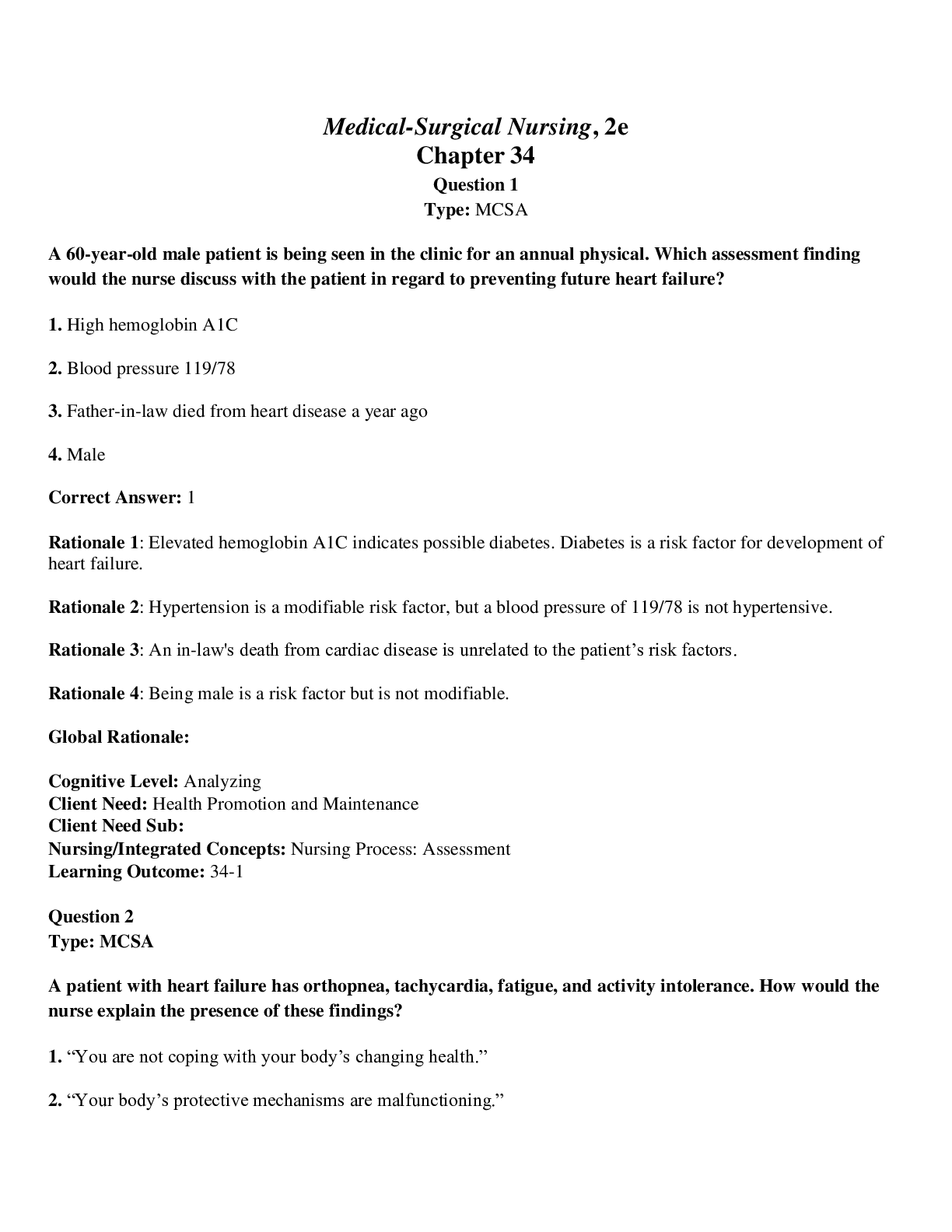
Buy this document to get the full access instantly
Instant Download Access after purchase
Add to cartInstant download
Reviews( 0 )
Document information
Connected school, study & course
About the document
Uploaded On
Apr 11, 2020
Number of pages
27
Written in
Additional information
This document has been written for:
Uploaded
Apr 11, 2020
Downloads
0
Views
42

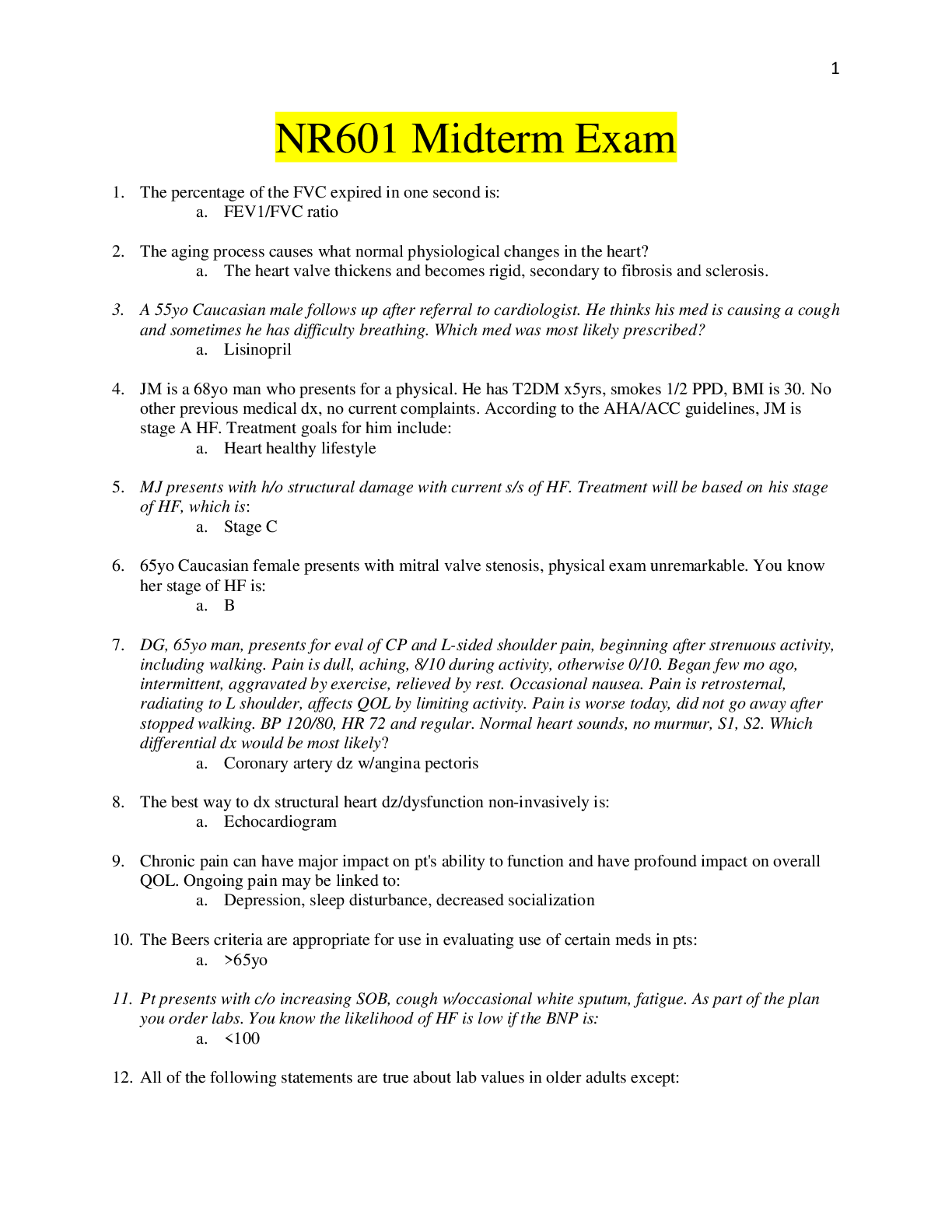
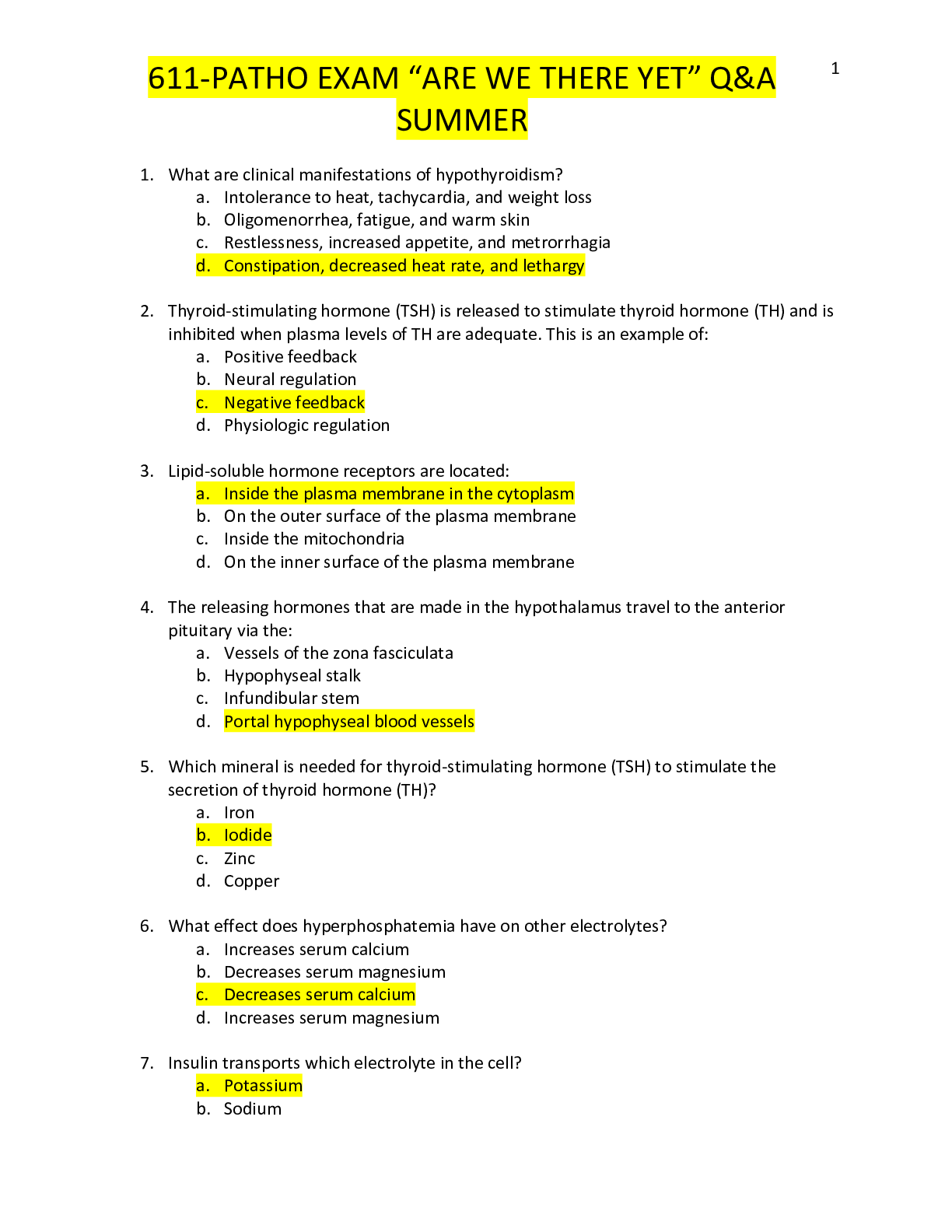
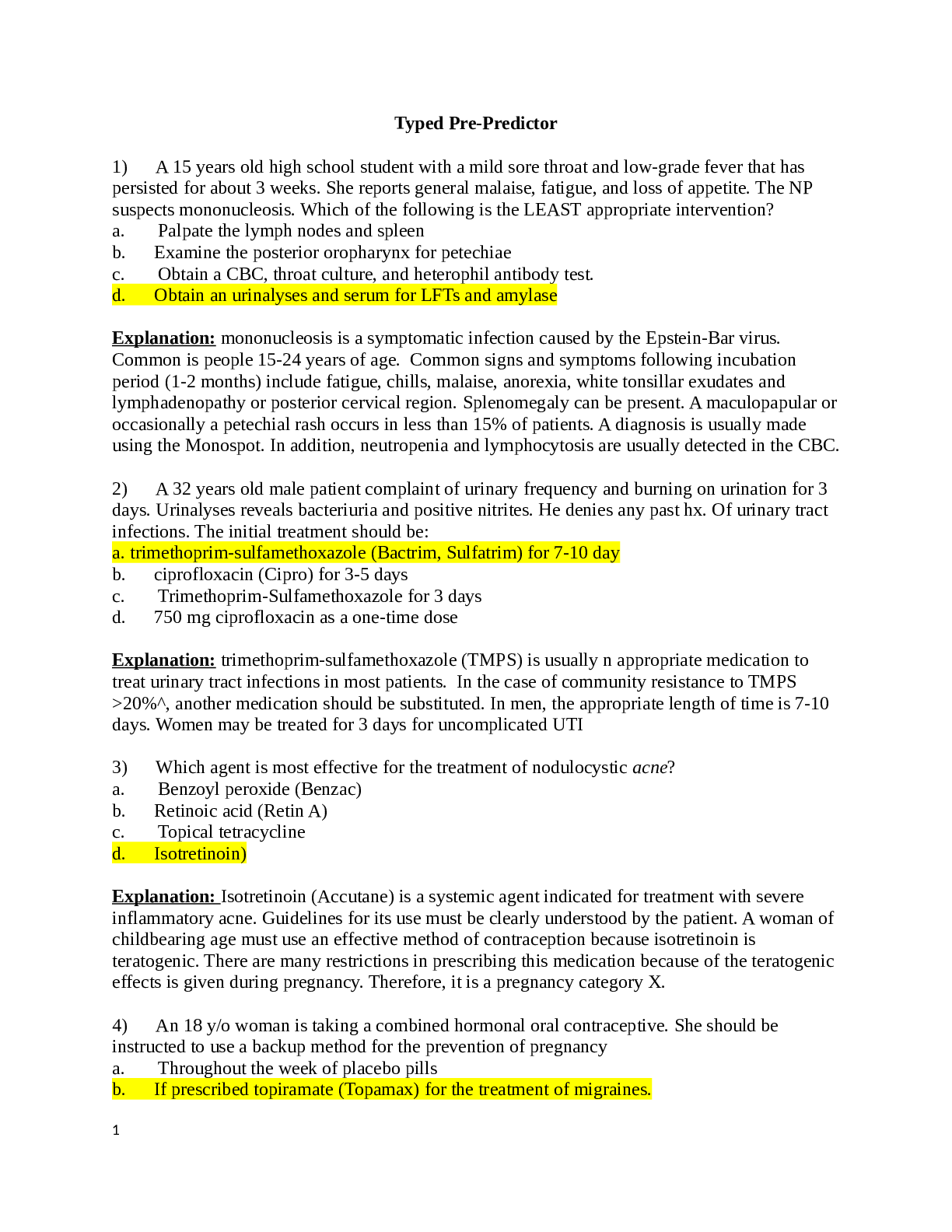
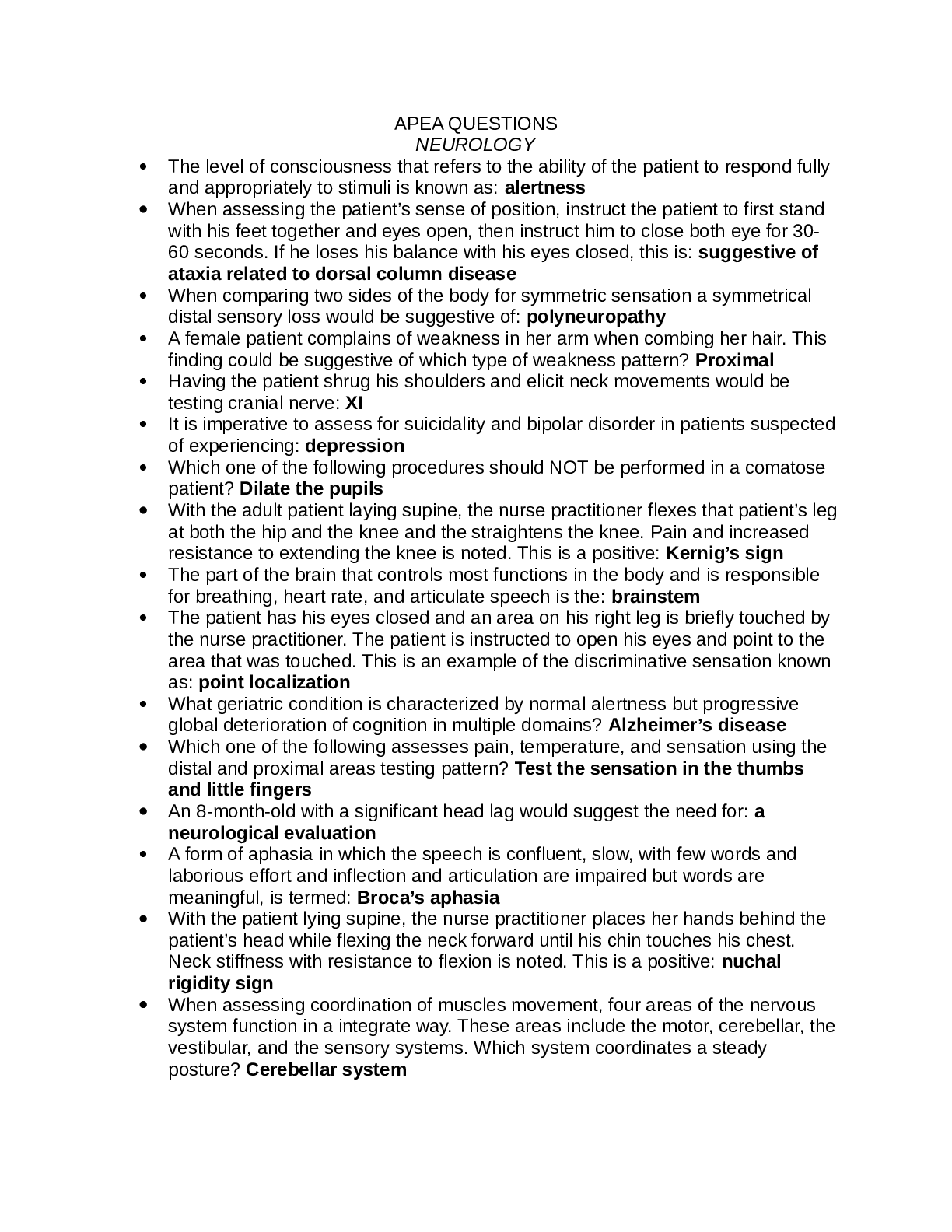
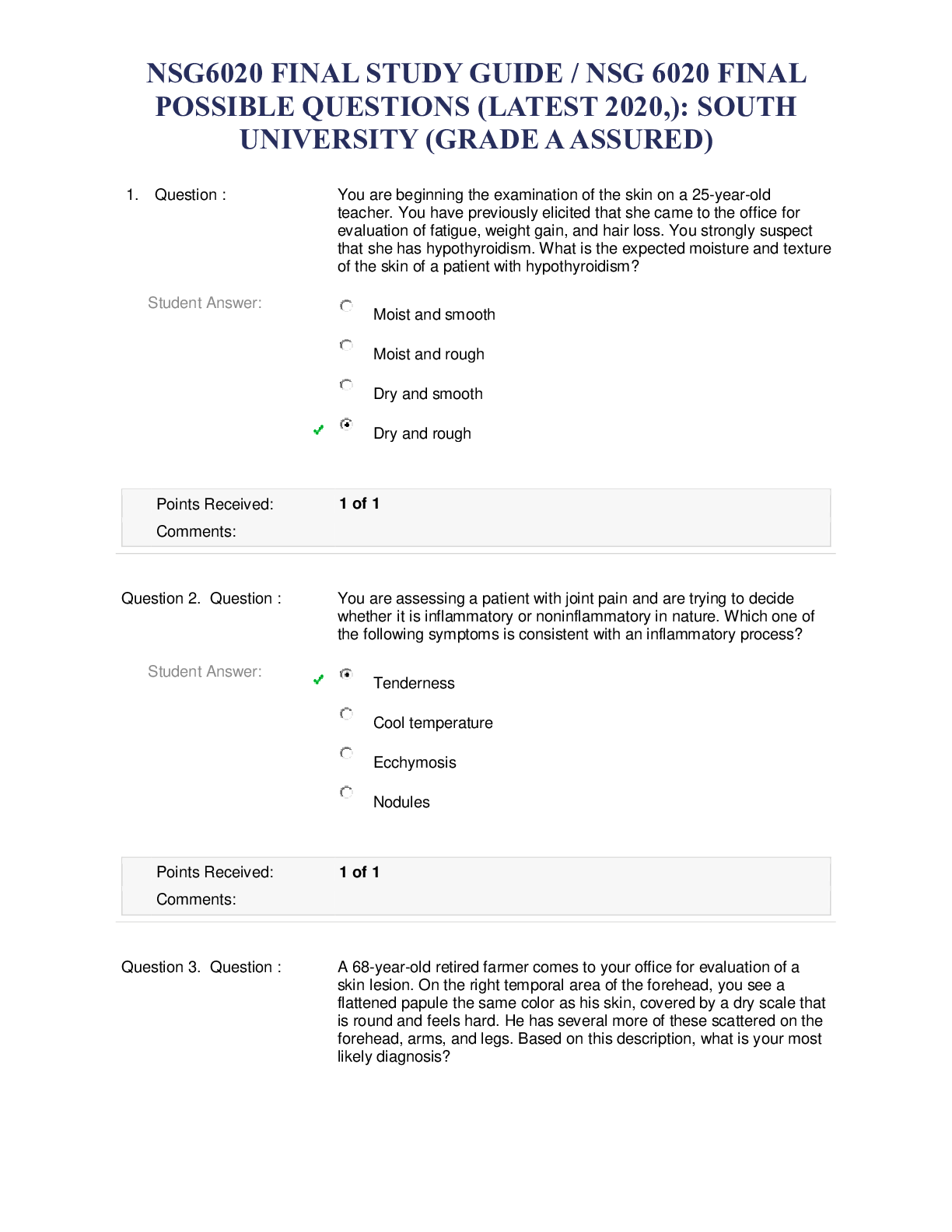
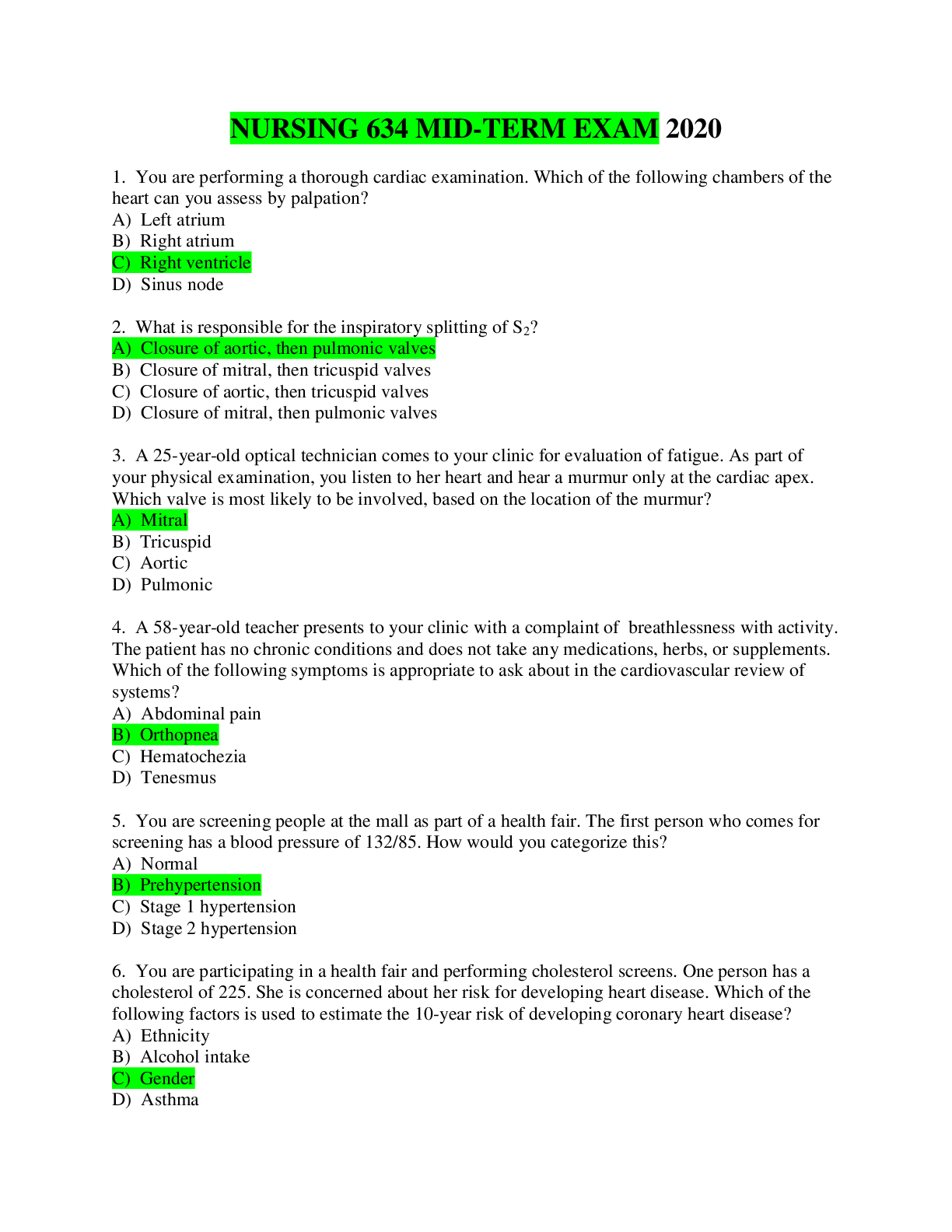
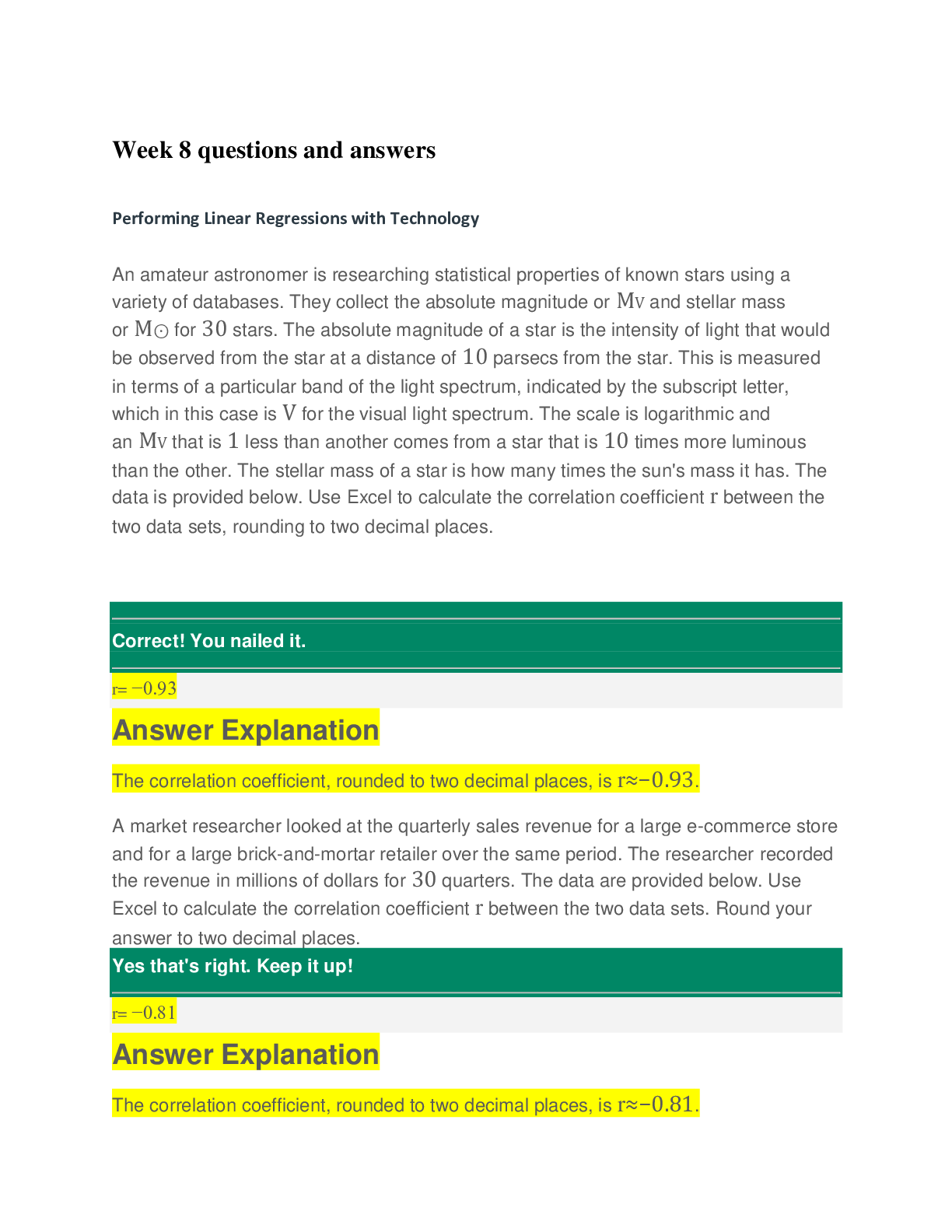
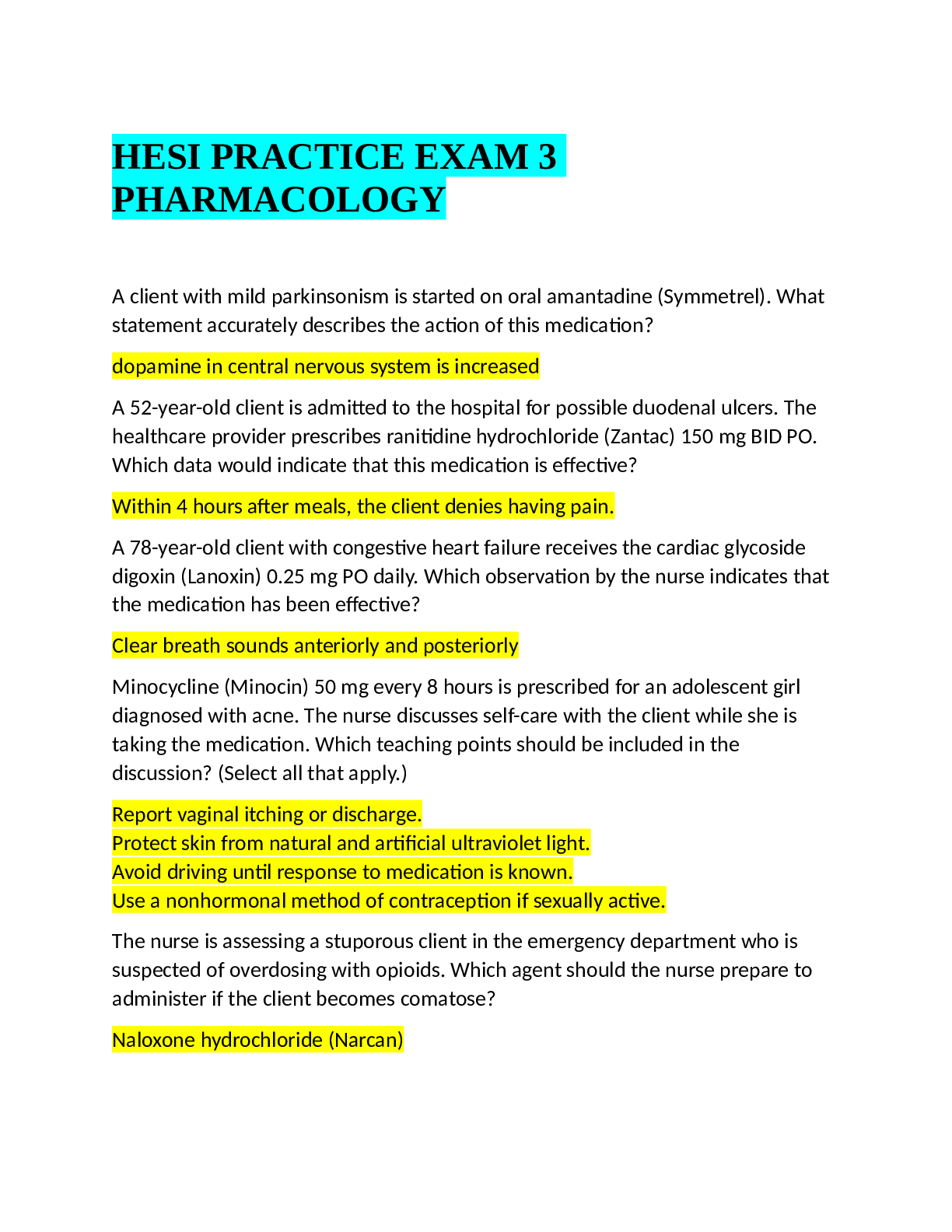
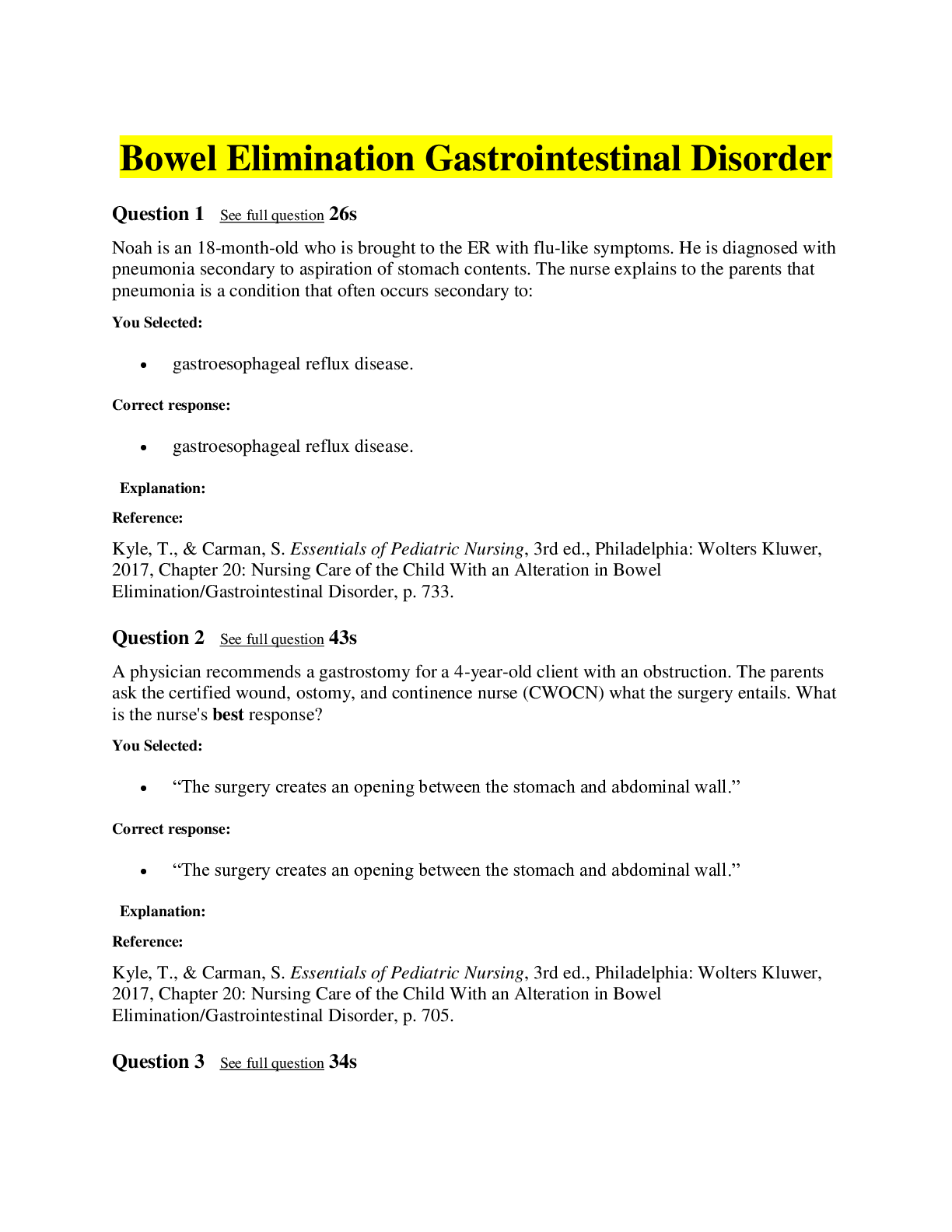

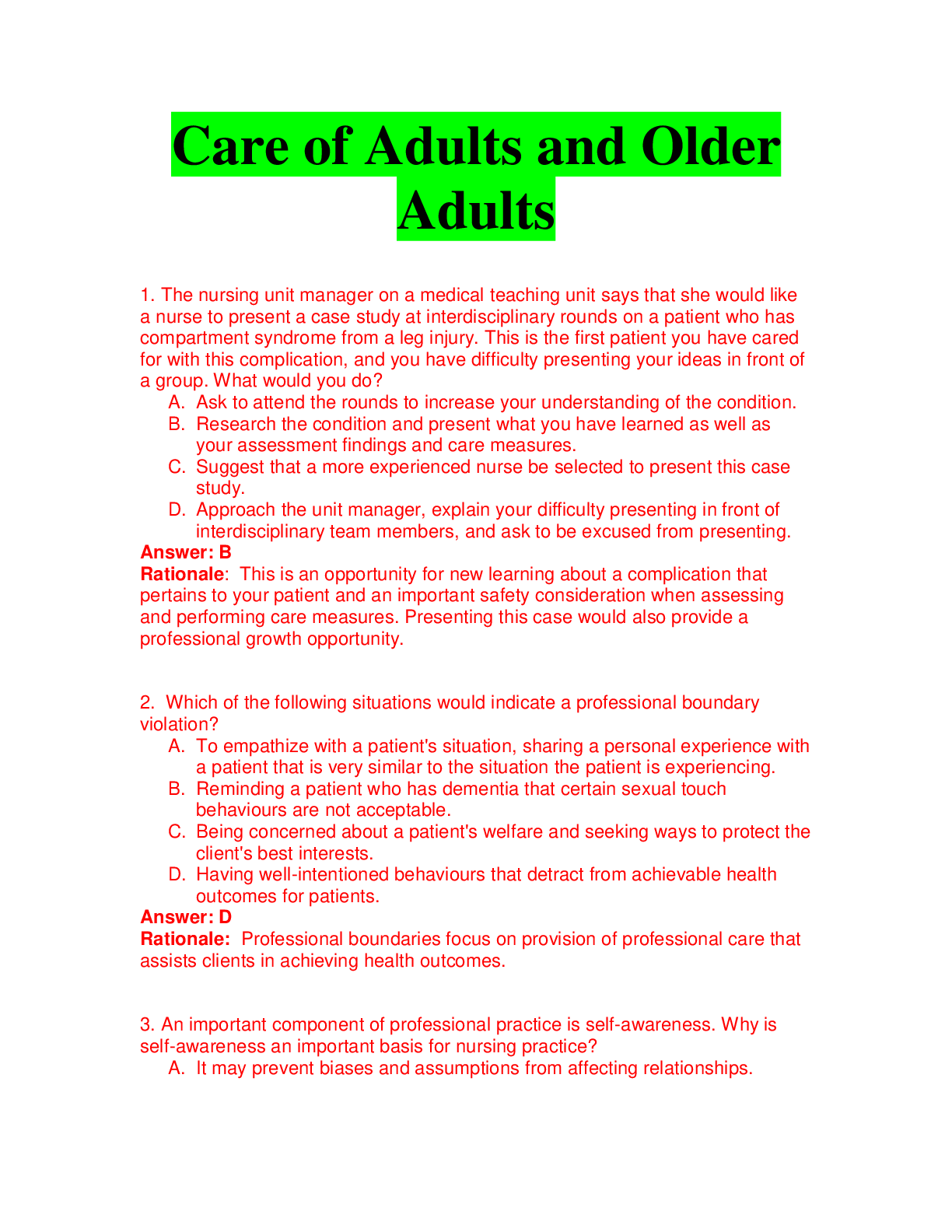
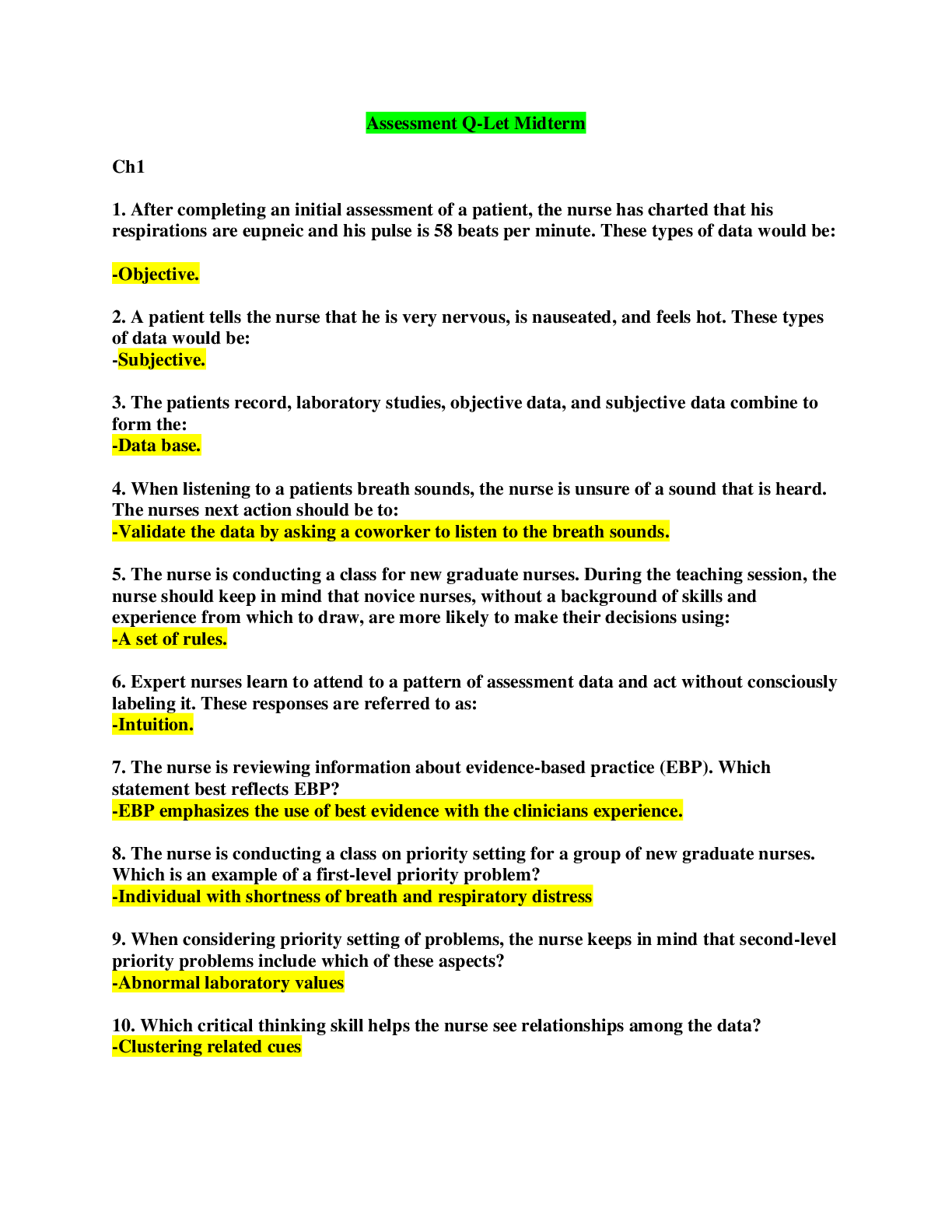
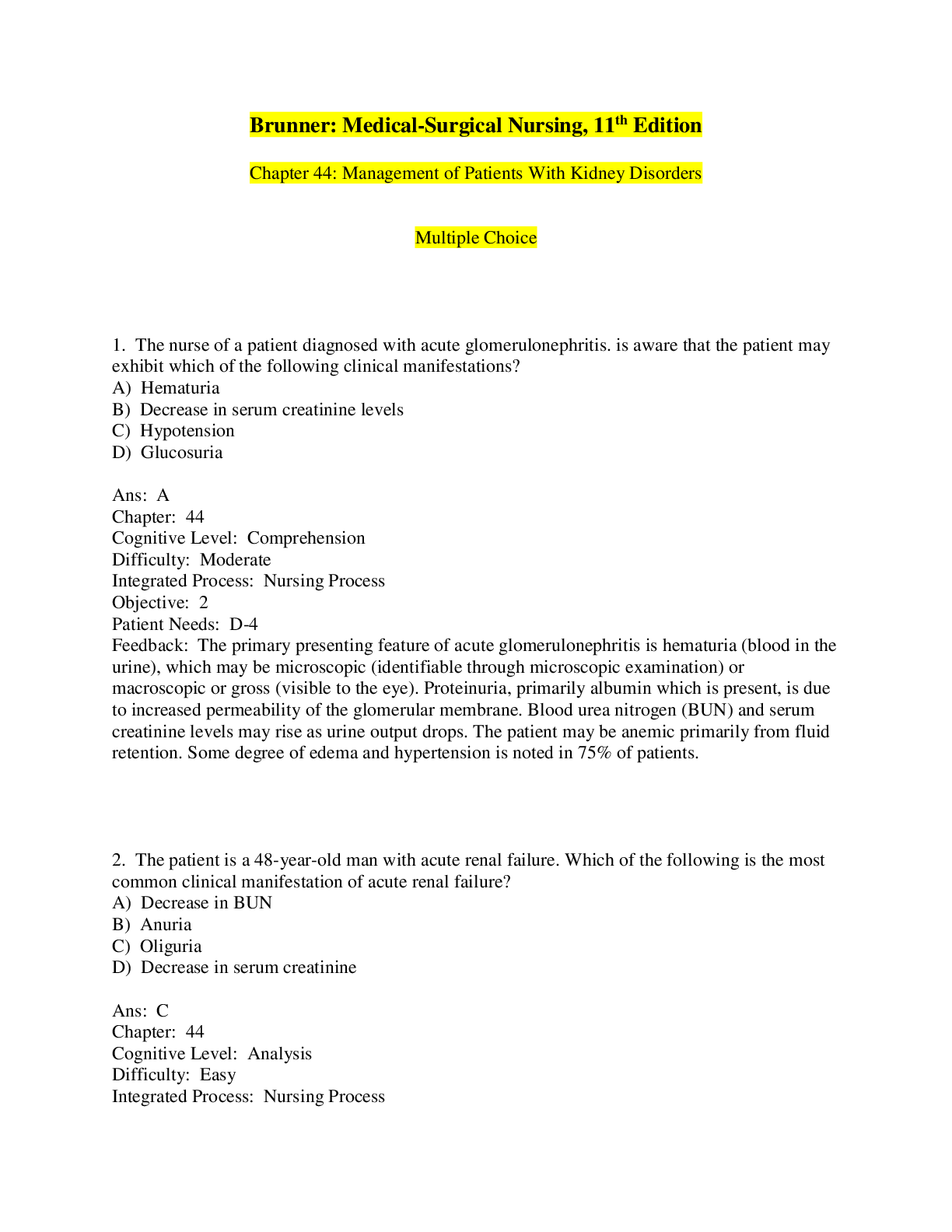
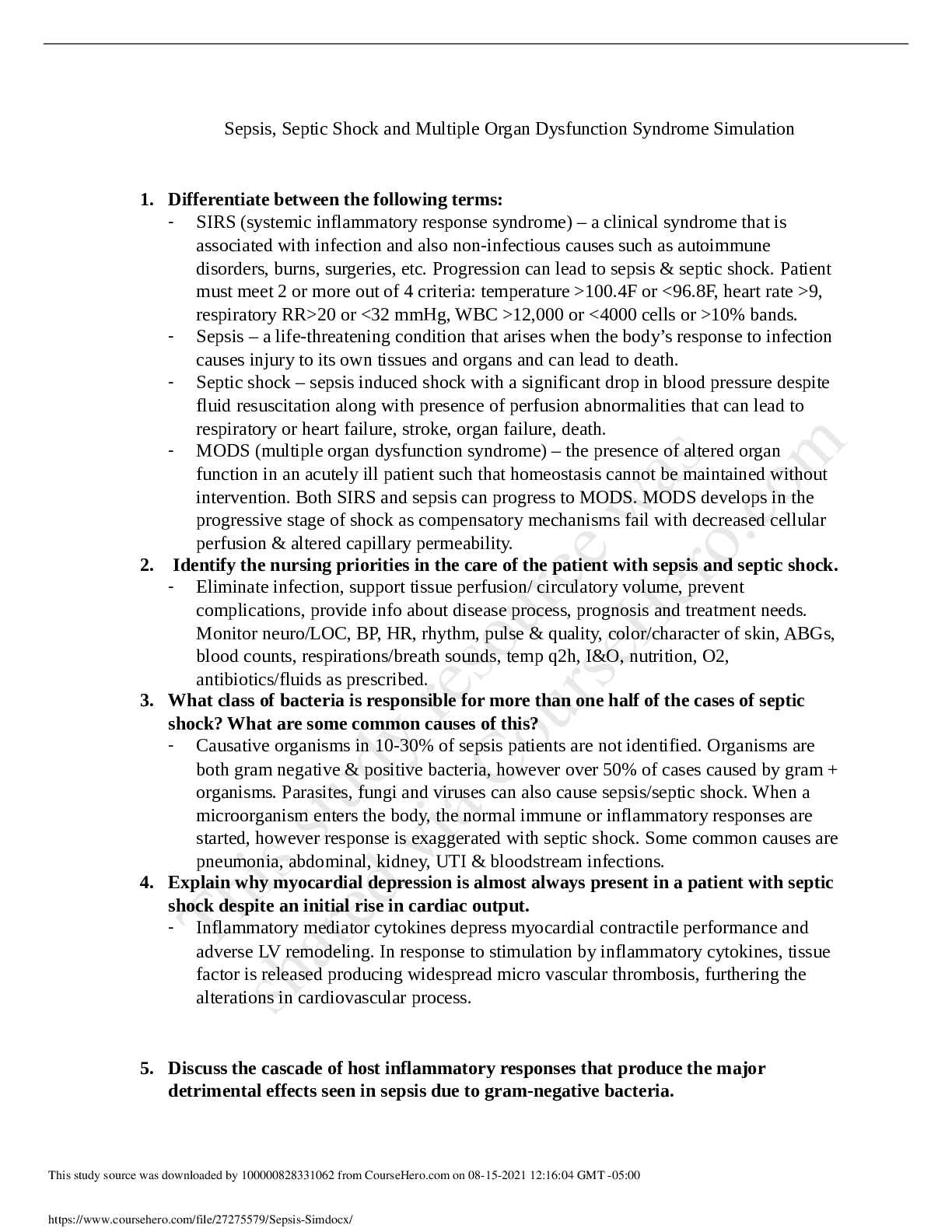
 Correct Study Guide, Download to Score A.png)
 Correct Study Guide, Download to Score A.png)

.png)
